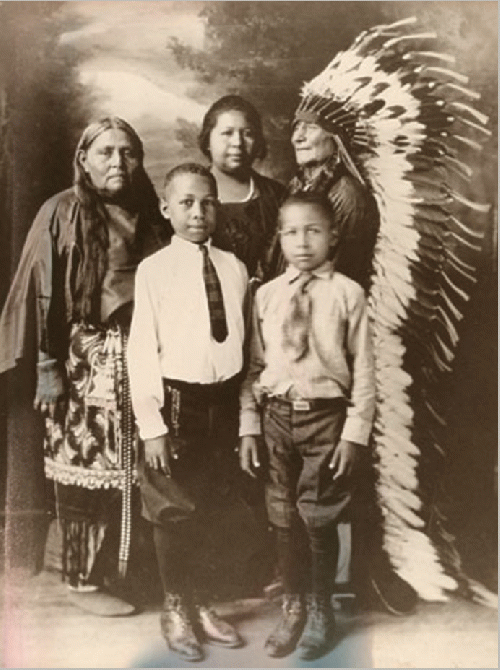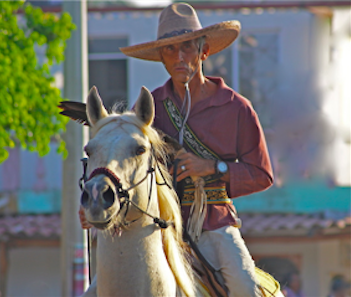
Comanche family, early 1900s Here is a family from the Comanche Nation located in southwestern Oklahoma. The elder man in Comanche traditional clothing is Ta-Ten-e-quer. His wife, Ta-Tat-ty, also wears Comanche clothing. Their niece (center) is Wife-per,
(Image by Smithsonian) Details DMCA
African Americans and Native Americans (aka American Indians) should be together in any discussion seeking to bring about reckoning America's history of racism, oppression, discrimination and inequality. Unfortunately "Indians" remain all but invisible in politics and media covering the new reparations efforts for descendants of Black slaves . Today I watched and listened to the well-intended promoters of HR 40 repeatedly ignore the fact that American Indians also suffer the continuing trauma. California's congresswoman of the 37th district, Karen Bass, even dismissed this option in June 19th hearings . Ironically she refers to an ignorance of history: "Our fundamental problem is our ignorance of history"Deep pain is caused by people who deny the holocaust and the same historical ignorance responsible for continuing assaults against African Americans." Note she refers to the European holocaust not the genocide against millions of Indigenous Peoples of the Americas
Such omission of full historical truth continued with the passionate claims of the congresswoman taking the lead on HR 40, Sheila Jackson Lee, who represents the 18thdistrict (most of Houston):
Let me be very clear, it is only this group, even though they attempted to enslave Native Americans, it is only this group that can singularly, singularly, claim to have been slaves under the auspices of the institution and leadership of the United States government" And so HR 40 is the response of the USA long overdue.
She continues her presentation citing accurate statistics showing inequalities between whites and African Americans in many categories. She refers to how prejudice against African Americans was codified in the constitution. Referring to 2 million slaves who died in slave ships and the 2 million plus more who died through two generations as slaves, she concludes by asking "Who has a history like that?!"
Who else? First off, the colonists slavery of the continents Indians was infamous in the colonieso actual slavery in the early colonies, including sending children to England as slaves. As for slavery of American Indians, in her January 18, 2016 article in Slate she titled "America's Other Original Sin," Rebecca Onion writes "Europeans didn't just displace Native Americans-they enslaved them, and encouraged tribes to participate in the slave trade, on a scale historians are only beginning to fathom." She cites research showing that between 1670 and 1675, "more Indians were exported into slavery through Charles Town than Africans were imported." However, slavery prior to the Declaration of Independence would not technically be "under the auspices and leadership of the U.S. government per se, referring back to Jackson Lee's assertion. Rather, what was official was a policy of extermination followed by genocidal wars, forced assimilation via theft of children and their heritage via boarding schools, and in 1824 by legally considering all Indians to be considered wards of the state under the newly formed Bureau of Indian Affairs operating under the Department of war. None of this surprising if one considers that the Declaration of Independence includes a statement after the famous words, "All Men are created equal," that refers to "merciless Indian savages whose known rule of warfare is undistinguished destruction of all ages, sexes and conditions."
Who else has a history of millions dying under the auspices of the U.S. government? Research on the number of Indigenous Peoples killed by Europeans via violence and disease in the larger Western hemisphere is estimated to be between 50 and 100 million. However, sticking to our own colonies and government in the lands making up the continental United States today, scholars estimate that the Indigenous population of the present-day coterminous United States was more than 5 million in 1492 and only about 250,000 in 1900. "These numbers would appear to indicate that the loss of life was around 5 million here. Such a population decline implies not only that some 5 million American Indians died during the 400 years but also that, in fact, many times the approximate figure of 5 million died, as new but ever numerically small generations of American Indians were born, lived, and died." Most of the scholars whose research offer such statistics do refer to the decimation as ethnic cleansing, preferring the term over genocide with the argument that actual killing of Indians was not the main intention. According to the Oxford Research Encyclopedia of American History, "At the very least, it could be said, genocide was present in the removal process in the sense that the policy's implementation depended on the government's threats to use unrestrained violence to secure compliance even though officials generally did not have to employ it."
Now let's have a quick look at comparative statistics representing oppression and inequality today. I do this reluctantly because I think it is wrongheaded to consider measure social injustices to see which groups suffer more. However, when the media continually compares Hispanics and Blacks to whites without mentioning American Indians and the current effort for truth and reconciliation about inequity in America does the same, well, someone has to do it. In brief, according to talkpoverty.org, in 2017 21.2% of African Americans fell below the poverty line and 25.4% of American Indians did in contrast to non-Hispanic Whites rates of 8.7. In all states with significant populations of American Indians, this group is overrepresented in prison populations compared to Blacks and Latinos. American Indians have worst achievement scores and lowest graduate rates of any student subgroup. An article by Greta Kaul (10/10/2018) entitled "Across a range of measures, Minnesota's American Indians fare worse than other groups. So why isn't it talked about more? Offering statistics about homelessness rates; household incomes; education graduation rates; health; life expectancy at birth; and criminal justice, American Indians do about the same or worse than Latino, Asian, and African Americans.
Congresswoman Jackson Lee also declared "Slavery is the original sin. Slavery has never received an apology." Actually, in 2008 the U.S. Congress did make a formal apology for slavery. But it was as empty as the one Obama gave to the Indians in 2010.
So why isn't the American Indian plight talked about more? Why do most people not know about the numbers of murdered and/or missing American Indian women in the United States? So let's agree an authentic apology was never give for either horror. But the continual references to African slavery as the original sin of the United States is the most egregious claim. How can well-intended legislatures honestly refer to the African American plight and history of slavery as the "original sin" without acknowledging what happened in Native America? In her book, The Future of Whiteness, Linda Alcoff states "I want to insist that whiteness has a very particular and unique relationship to historical atrocities such as slavery and the genocide of native peoples" This produces a content to whiteness despite its immense variety of moveable boundaries" (2015, p.9). Even with this awareness Alcoff also contributes to a distortion of American history in separating "slavery," with its implied reference to African slavery, from the genocide of American Indians who by the millions were in essence made slaves or treated worse than slaves starting in 1492. Alan Gallay, Director of The Center for Historical Research at Ohio State University and recipient of the Bancroft Prize for his book, The Indian Slave Trade: The Rise of the English Empire in the American South, 16701717 (2003) writes:
The paradigm of "what happened" to American Indians under European colonialism must be revised. Instead of viewing victimization of Africans and Indians as two entirely separate processes, they should be compared and contrasted. This will shed more light on the consequences of colonialism in the Americas, and how racism became one of the dominant ideologies of the modern world. It is time to assess the impact of slave trading and slavery on American Indian peoples, slave and free. See https://ap.gilderlehrman.org/essay/indian-slavery-americas
The call for reparations is a call for truth and reconciliation for Black slavery. Compensation should be for preventing continuing oppression and giving more financial opportunities of African Americans, rather than some formula to give some money to proven ancestors of slaves. Only by admitting the history, its subsequent and continuing historical trauma, and behaving with respect for all people, will reparations ever be realized. And this includes ending unconscious territorialism and looking squarely at the true original sin of the United States of America.





